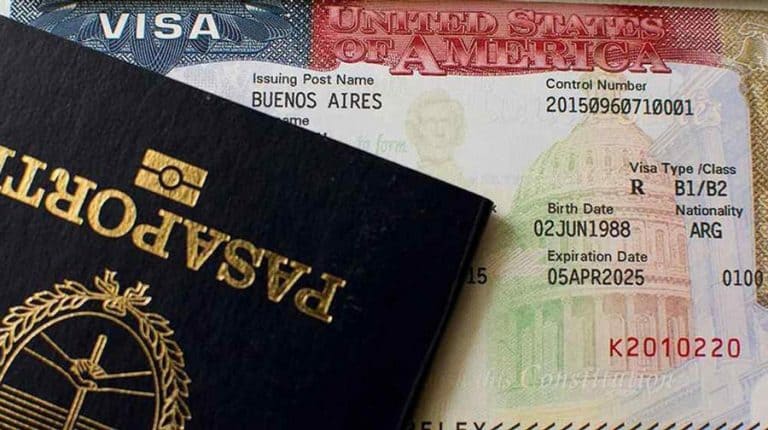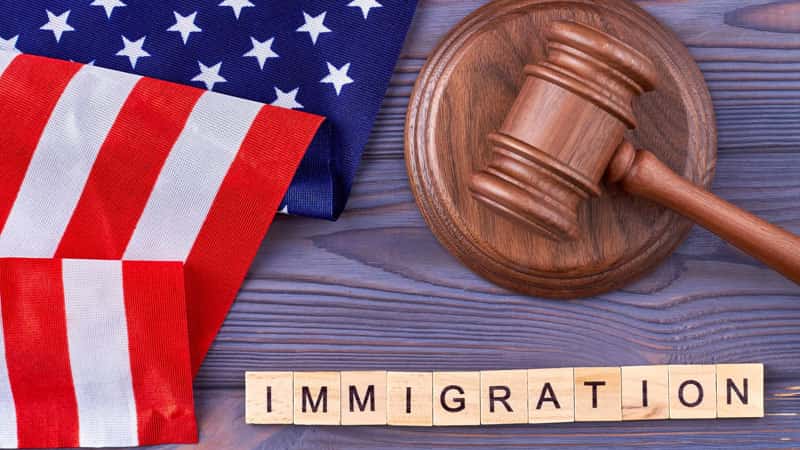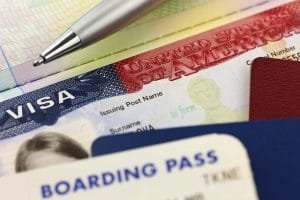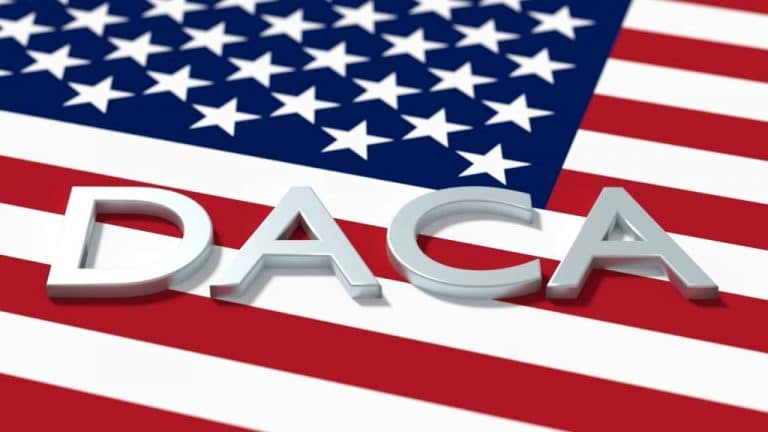What is the immigration visa?
You are probably wondering: What is the immigration visa? To legally enter the United States it is necessary to have a visa, which is a mandatory document to enter the country and, in the following article, we will talk about the immigration visa. An immigration visa is a visa that allows a person to enter the United States. There are several types of visas available depending on where you come from and your plans once in the United States. In this article, we will discuss the different visa options for those who plan to live in the United States permanently or temporarily.
What is an immigration visa and why is it important?
An immigration visa or immigrant visa is a permit to enter the United States for an indefinite period of time and is commonly sought by people who want to move permanently to the country.
Likewise, it can be given to immigrants for family ties, a permanent job offer, a diversity program, business investment or through an asylum application.
Types of visas we can apply for
Each visa has its own set of requirements that must be met to be eligible. These requirements are different depending on your location and your intentions. For example, if you plan to live in the United States temporarily, the visa will require a valid passport from your home country along with proof of employment or school enrollment for the duration period specified by the visa type. If you plan to work legally in the United States on a permanent basis, then you will need more than just an immigration visa; instead, you will need something called a “green card.” The green card requires a lot of time and paperwork before it is approved, so keep that in mind when planning.
There are currently several types of visas, however, the most commonly used and popular are:
Family Visa
This type of visa is also known as a family visa and is intended to reunite family members in the United States.
The applicant must be a legal resident or U.S. citizen, and must plan to reside permanently in the country and has two categories:
Unlimited Relative Relationship: Within this subdivision are; spouse, unmarried children who are under 21 years of age, widow/widower and parents of the U.S. citizen 21 years of age or older.
Limited Kinship Relationship:
- Spouses, children who are minors and unmarried children over the age of 21 of the lawful permanent resident applicant.
- Siblings and their spouse and minor children, however, the U.S. citizen must be of legal age.
- Unmarried children over the age of 21 and minor children of the lawful permanent resident.
- Married children and their spouse and minor children of a lawful permanent resident.
Fiancé Visa
Known as a K-1 visa, this visa is granted to foreign nationals who become engaged to a U.S. citizen.
This visa allows the fiancé(e) to travel to the country and marry the applicant within 90 days of arrival in the country.
Employment-based visas (ETA)
If you plan to work in the United States temporarily, then the visa will require a valid passport from your home country along with proof of employment or school enrollment for the duration period specified by the visa type.
Study visas (F visa)
If you plan to live and study abroad temporarily, there are different types of visas available depending on the study program you will be participating in. There is an F visa for those who want to study at a university, as well as other options such as vocational training, English language schools, etc.). However, if your plans do not include studying, but simply traveling and working while abroad, then this visa may not apply to you.
Temporary work visa (H visa)
If you plan to live in the United States temporarily but also want to work while you are there, this visa will allow you that opportunity. However, the visa does not provide any other benefits or rights, such as college acceptance, travel abroad, etc.; instead, it only provides employment opportunities for those who are living in the U.S. temporarily and wish to gain experience with legal work. There are certain requirements a person must meet before being eligible for an H visa which include: having legal status in their home country (their passport from their home country), providing proof of pre-established employment within the United States along with securing a visa interview appointment.
Permanent Resident Visa (Green Card)
The green card is a more permanent type of visa available depending on how long you have lived in the United States.
There are several types of visas available depending on your plans for once you arrive in the United States, so be sure to find out which visa is best for your needs before you file a visa application. submitting a visa application.
Different visas provide individuals with many benefits such as college acceptance, employment opportunities and travel abroad, etc., but these can only occur if you first obtain your visa. Be sure to research what type of visa would best suit your own plan and need before applying. All visas require an interview process, so it is important that you schedule one in advance.



What is a nonimmigrant visa?
They are provided for those foreigners who do not intend to remain in the United States permanently, such as tourists and business visitors.
It is essential to be aware of the types of nonimmigrant visas when applying for one to enter the country in order to know which one best suits your needs.
The non-immigrant visas are:
- Athletes, amateur and professional (competing for prize money only): B-1
- Athletes, entertainers, entertainers: P
- Australian worker – professional specialty: E-3
- Mexico Border Crossing Card: BCC
- Business visitors: B-1
- Crew (on duty aboard a ship or aircraft in the U.S.): D
- Diplomats and officials of a foreign government: A
- Domestic employees or nannies (must accompany a foreign employer): B-1
- Employees of a designated international organization and NATO: G1-G5, NATO
- Exchange visitors: J
- Exchange visitors – au pairs: J-1
- Exchange visitors – children (under age 21) or spouse of a J-1 visa holder: J-2
- Exchange visitors – professors, researchers, teachers: J-1
- Exchange visitors – cultural exchange: J, Q
- Fiancé(e): K-1
- Military and foreign personnel stationed in the U.S.: A-2, NATO1-6
- Foreign nationals of extraordinary ability in the sciences, arts, education, business or athletics: O-1
- Chile Free Trade Agreement (FTA) Professionals: H-1B1
- Free Trade Agreement (FTA) Professionals Singapore: H-1B1
- Media information representative (news media, journalists): I
- Transfer of employees of a company: L
- Medical Treatment: B-2
- Professional workers NAFTA (NAFTA) Mexico, Canada: TN/TD
- Nurses traveling to areas with a shortage of health care professionals: H-1C
- Physicians: J-1, H-1B
- Religious workers: R
- Specialty occupations in fields requiring highly specialized knowledge: H-1B
- Students – academic and language students: F-1
- Dependents of students – dependent of visa holder: F-1, F-2
- Students – vocational: M-1
- Student dependents – dependent of visa holder: M-1, M-2
- Temporary agricultural workers – seasonal: H-2A
- Temporary workers – non-agricultural: H-2B
- Visitors for tourism, vacation, pleasure: B-2
- Training in a non-employment program: H-3
- Investors: E-2
- Traders: E-1
- In transit in the United States: C
- Victims of trafficking in persons: T-1
- U.S. Visa Renewals – A, G, and NATO: A1-2, G1-4, NATO1-6

How do I pay for the US visa?
Depending on the type of visa the visa fees will be different, where, non-immigrant visas are:
- Tourist, business, transit, crewman, study, exchange visitor, and journalist visas: USD 160.
- Petition based visas (H, L, O, P, Q, and R): USD 190
- Treaty trader and treaty investor visas (E): USD 205
- Fiancé(e) Visas (K): USD 265
- Border Crossing Card (15 years old and over): USD 160
- Border crossing card (Up to 15 years of age): USD 15
Payments are to be made to the NVC (National Visa Center) before the scheduled interview appointment.
At the same time, if you have not paid the fee, it can be made at the Consulate on the day of your interview, either in cash (pesos or dollars and it will depend on the exchange rate implemented by the Embassy) or with an international credit card.
What is the Visa Waiver Program?
Also called Visa Waiver Program (VWP) is the one that allows foreign citizens to travel to the USA for business or tourist reasons for a period of time less than 90 days without having to have a visa, although not all countries participate in this program. The immigration visa is a very broad topic, therefore, it is essential to have valid and updated information on visas to avoid inconveniences when requesting a visa or being approved by the U.S. government.
What does issued mean on the visa?
The word “issued” means “issued” in Spanish, that is, a visa issued is a visa issued or approved.
Once your documents are approved, you will be able to enter the United States within the validity period of your visa in order to acquire the I-551 form (green card) or registration number that will allow you to work or reside in the United States.








